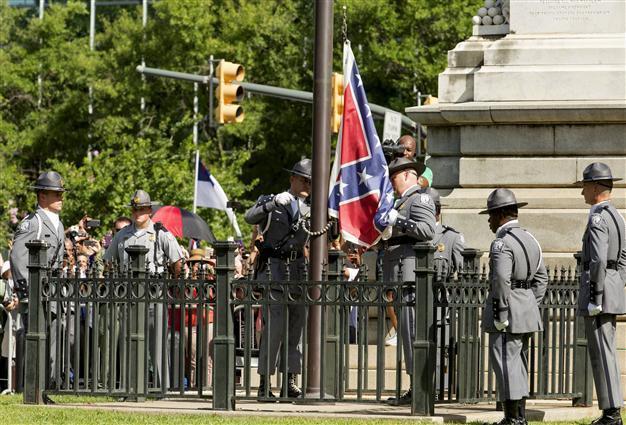Confederate flag comes down at South Carolina legislature
WASHINGTON - Agence France-Presse

The Confederate battle flag is permanently removed from the South Carolina statehouse grounds during a ceremony in Columbia, South Carolina, July, 10, 2015. Reuters Photo
The divisive Confederate flag came down on July 10 at South Carolina's legislature, drawing a line under a furor rekindled last month by the murder of nine black churchgoers by a young white supremacist.Thousands gathered at the State House in Columbia to cheer the removal of the red, white and blue Civil War-era battle flag, regarded by many as a bitter symbol of racism and slavery that has no place in modern America.
Many chanted "U-S-A! U-S-A!" as a state police honor guard in white gloves ceremoniously lowered the flag and then neatly folded it under brilliant sunshine.
"A signal of good will and healing, and a meaningful step towards a better future," President Barack Obama, the nation's first black president, said on Twitter.
The flag has been a focal point of controversy in South Carolina -- birthplace of the Confederacy -- since it was raised in the early 1960s atop the State House dome in defiance of the civil rights movement then sweeping the United States.
It was relocated in 2000 to a 30-foot (10-meter) flag pole alongside a memorial to Confederate war dead on the State House lawn.
But it became a lightning rod for outrage after the June 17 killings of nine black worshippers by a young white gunman during a Bible study class at Emanuel African Methodist Episcopal Church.
The dead included Emanuel's chief pastor Clementa Pinckney, a Democratic state senator.
Dylann Roof, 21, indicted on nine counts of murder, had been photographed before the attack brandishing both firearms and the Confederate flag.
Under state law, the flag could only be removed with the approval of two-thirds of South Carolina's Senate and House of Representatives.
That came this week, with both houses -- dominated by Republicans -- voting overwhelming in favor of taking down the flag after impassioned hours of debate.
Governor Nikki Haley, a Republican, signed the order into law on July 9, flanked by relatives of the Charleston dead.
"The State House is an area that belongs to everyone and no one should ever drive by the State House and feel pain," Haley told NBC television on July 10.
"I think this is a hopeful day for South Carolina. I think it is a day that we can all say that we have come together as a state," she said.
On its final night on the pole, the Confederate flag was surrounded by a barricade and guarded by nearly two dozen state troopers, as police imposed a ban on carrying firearms in the State House vicinity.
Seen among the crowd who lingered overnight was an anonymous middle-aged white man in the uniform of a Confederate infantry soldier.
"I'm disheartened that this flag has been stolen and used for hatred and something divisive, which it is not," said Terry Hughey, commander of the Columbia branch of the Sons of Confederate Veterans.
"I always thought of it as love and honor for my ancestors," he said, quoted in the city's State newspaper.
But the National Association for the Advancement of Colored People, a major civil rights organization, hailed the flag's removal.
"By removing the flag, South Carolina not only denounces an odious emblem of a bygone era but also honors the lives of nine students of scripture who were gunned down in a church," its national president Cornell Brooks said.
















